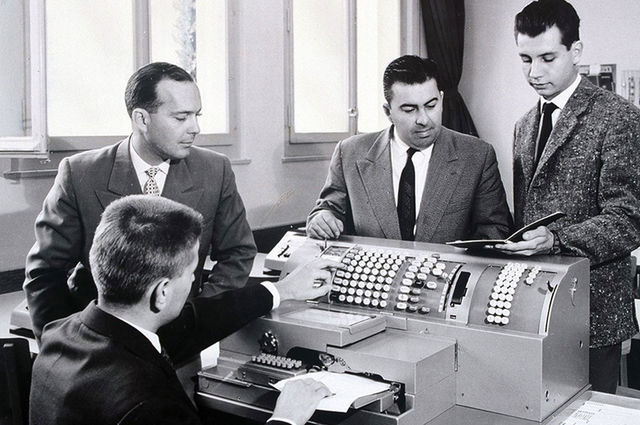The Death of Yesterday’s PMS: Embracing the New Normal
26 experts shared their view
The PMS' role as the center of a hotel's technology ecosystem is coming to an end. Crucial guest data sits locked up in today's disconnected data silos, making it very difficult for hotels/brands to optimize and bank in on the 'digital guest journey'. True? If so, how could a future application/data infrastructure or migration path look like? What's your take?
Does anyone remember the NCR 4200. Used as the front desk and night audit posting machine? That dinosaur was replaced by what we thoughtlessly named the “PMS” (which would have been better named 'PMIS” for “information system.”) Well, it is about 46 years later and things surely have changed. Chains and management companies want and need a combination of CRS, PMS and CRM systems, seamlessly integrated for all of their properties.
With the advent of cloud-based systems, we've reached that ability, and many chains have already relegated the on-site systems to the role once accomplished by the 4200 – data gathering and posting. Forty-six years to come full circle. Hmmm.
What will this look like forty-six years from now? My bet is that it will take less than a decade to eliminate the on-site system entirely, using workstations connected directly to the CRS-PMS-CRM database managed in the cloud by the chain. Not even a 4200 equivalent in site. Except for independent hotels. That reduces the market to about 12% of the North American hotels for vendors continuing to offer PMS systems in their present form.
The history of the electronic PMS system will not define its future: it was an anomaly born of its time, the dawn of the Information Age when computerization costs were so exorbitant that the PMS had to enter the industry as an accounting system, and then only in the largest hotels in the world. It also explains why IT departments have traditionally reported to the accounting team – in the beginning, they were symbiotic parts of the same whole.
The PMS is in the process of being deconstructed into its core components. There are entirely separate systems that manage room inventory, distribution channels, rates, revenue, customer relationships, and service optimization. Each deals with more data than was offered in traditional PMS products that attempted to manage every site from five to five thousand rooms.
Still, we think in time-locked anomalies; we can't imagine what we can't imagine. Nonetheless, stir in Artificial Intelligence, robotics, enlightened self-service, data privacy, and ownership issues, and supercharge it all through a smartphone network that puts every human online 24x7 and the outcome will be totally unlike its predecessors. Expect that hospitality apps and data will be globalized above the chain level; property management will cease being individualized. Transportation and accommodation providers will subscribe, recognizing every traveler on a first visit or a fiftieth. I wonder if major chains realize they're in the process of being Uberized?
The failure of PMS to provide a central depository of guest data has forced hotels to invest in a wide variety of systems all of which means data is in my instances is siloed Hotels need to provide a high level of personalization and to achieve this objective, hotels have to be able to interact with guests from the beginning of their journey to when they depart and even afterward and for that to happen we need to consolidate all this data in a single repository
PMS has failed to provide this and as such we are now seeing the arrival of several options one of which is the service bus technology first introduced by Citizen M and now this technology is being brought to the market by at last count 3 vendors and maybe more will be on display at Hitec 2019 .
We are also now seeing high-level integration between CRS and PMS with most guest profile data being held in the CRS. With the 2 largest CRS vendors about to release next generation cloud-based PMS, we are going to see in my opinion a seismic shift away from the traditional PMS functionality to the point that PMS may only be used at the property level to provide check-in/out and some AR functions. This process will not happen overnight as many people charged with replacing their PMS are rusted on to one or 2 traditional PMS vendors and will not easily change. However, if hotels are to provide the level of personalization that guests today demand the move away from the traditional role of PMS is inevitable. Cloud-based systems incorporating CRS, PMS WBE, RMS and on property systems such as housekeeping, service request software, etc will become the norm in my opinion
There will always be a system that is at 'the heart' of a hotel, whether we call it PMS, CRS, CRM, CRPMS or something else with a C or a P in it... We need a place where we can store inventory, rates and customers.
Our problem today is that we don't have a single platform. Functionality is spread between systems, with clunky interfaces in between. In addition systems are often distributed and that means that data gets duplicated or just lost.
But the future is bright! Most PMS and CRS vendors are working on cloud based centralized solutions that combine functionality of different Cs and Ps and maintain single depositories for customers and inventory. This will really open up for recognition, personalization and profit optimization all along the guest journey, both online and offline.
This is 100% true for many hotel companies! On-premise PMS, not always with a standard configuration, makes it extremely difficult to consolidate the guest profile data and maintain it, inhibiting personalization and marketing opportunities. The focus on cloud-based "hospitality systems" which take on the roles of PMS, CRS, CRM, etc. on a single database will open up a world of new opportunities and ways to operationalize the data, showing value to the guest as well as staff. Taking what used to be very separate systems and databases and building them into one platform also reduces the need for so many interfaces or integrations, but when you do need them, open API's publicly available and free of charge are the way to go!
I think we will see the term "PMS" used less and less, and we'll need to agree as an industry what to call this new evolution of consolidated hospitality systems...
The original PMSes were the equivalent of an ERP - Enterprise Resource Planning tool. They were monolithic bits of software that tried to do everything and failed in most things. Start from scratch and build outwards from the customer/guest and redesign processes around stays of varying durations (hours to months) and “hire” of assets and spaces. There is no need for a historical process such as check-in, checkout, night audit, key cutting, reconciliation etc.
A guest should be able to complete 100% of the hospitality processes before arriving and should be able to leave without touching the sides if they choose. Focus instead on the concierge, human or virtual, and helping a guest make the most of their experience when on and near the property. Five-star brands should have emphatic people on hand to deliver personal service, in the lobby or the restaurant. Three-star brands should exploit low-cost kiosks and mobile apps to link guests with nearby opportunities. Customer data remains the core asset, but the customer should own it and be able to take it with them and share parts with the travel brands they select.
Brands should vie to deliver loyalty and rewards to the best customers, not expect customers to be loyal to them. No PMS, no problem.
We have always seen our PMS as a part of the hotel technology stack, but not the centre of it. If we can service all of our guests needs without them ever interacting with the PMS or someone using the PMS then we have succeeded. We ensure that our vendors understand the entire tech stack before we make any commitments to them so they understand where they fit in and what data flow will be needed to service our CRM, BI and Finance tools.
For real change to occur the whole concept of what a PMS needs to be would have to change. The traditional check in / out is dated, not many brands have got mobile right yet and many feel they are trapped because the PMS is at the centre of their ecosystem. For me, it is less of a technology change and more of a culture one.
For decades, the fundamental business model for hotel technology stack companies was "vendor lock-in". The property management system supplier essentially controlled access, data and functionality. Innovation was stifled as ancillary systems and third party developers were often stymied by hostile integration or financial terms.
Credit CitizenM with deploying its "Enterprise Service Bus", that gave the hotel operator control over its data, enabling the introduction of new technologies as bolt-on services - accessing and sharing data with other components of the tech stack.
Secure, authenticated control of data and efficient/seamless integration with distributed platforms is critically important for the future as the industry finally begins to rely on cloud computing and data container development as AI, 5G and IoT begin to make things really complicated - especially with sophisticated travelers expecting high performance service delivery with a high degree of personalization.
It's about time...
If today's technology existed in the 1980s, the CRS and PMS would never have been built as two separate systems. Yet, we still live with that legacy; change comes slowly to our industry. The only thing more difficult than getting a new PMS installed is removing an old one.
We can see a logical process using new technology by looking at some of the “new” industries on our periphery, such as home and ride sharing. Core systems are first created to enable the business and functionally follows to support operations and back-office functions. Some of the new entrants in our space follow this model, but the fragmentation in hotels combined with the legacy install base with most chains makes this evolution painfully slow. A new hotel group can take advantage of this new tech, but it isn't so easy for the others.
Hotels need to get back control of the data on their businesses and especially on their guest. the latter can be enabled by "service bus technology". Adding onto this the approach of working with SAAS platforms this starts to become possible. Yes we will still need PMS but with a more flat architecture allowing the movement of data a lot easier between systems. the days of the PMS in the center and working with interfaces are numbered.
The biggest obstacle I see in achieving a data-driven 'digital guest journey', are the legacy PMS's that are widely used in our industry; they might be 'legacy', but they are very deeply interfaced with all the other on- and above property systems we all use. These integrations pose the biggest challenge to migrate to a more open and data-centric Hotel IT Ecosystems.
In my opinion the currently most feasible approach is to off-load the direct-to-PMS interfaces to a business-bus-logic (or middle-ware) and thus becoming independent from the direct-to-PMS Interfaces.
Once all your hotel core systems (like CRS, PMS, RMS, etc) interface with that business-bus-logic (rather than direct to the PMS) it is a lot easier for us hoteliers to migrate to the new generation data-centric applications we need to facilitate the 'digital guest journey'.
The challenge once again will be to convince all our stakeholders that these technology investments are necessary and will deliver an acceptable ROI.
The current PMS has failed at all levels: In spite of numerous attempts, no PMS vendor has been able to create any meaningful CRS, WBE, RMS, CRM, DMS, On-property Guest Services applications like HotSOS or Alice App. The PMS has failed miserably even in one of its supposedly core functionality: serve as the Big Data depository of cleansed, up to the minute guest data.
The role of the PMS as a central depository of guest data is coming to an end. Dispersed data/small data with “snackable” nuggets of data that are used in real time at the right time and in the right dosage will rule the hotel tech world. I believe the future belongs to a new type of cloud-based open architecture tech stack, where all tech providers are plugged in (PMS, Guest Services, RMS, CRS, CRM, DMS, ORM, etc.) as “equal right” participants and share relevant real-time guest data in the form of easy to assemble and actionable snackable guest data nuggets.
The idea of providing a [digital] personalized experience to a guest has been the Holy Grail of the Hotelier since I don’t know when – it’s just been so long. Computers were supposed to “at the press of the proverbial button” do it all – but that as we know far too well, has not been the case. Until now, they’ve been siloed in their approach to process handling – and the industry has very much revolved around the best-of-breed and interfaced approach versus integrated. Simply because, one-size does not fit all.
Having said that, hotels were [originally] of the belief that all guests should be treated equally – but again as we know – some are more equal than others, and their spend per head quickly dictated as to what colour would be the carpet that awaits their arrival…and how many associates are rostered to cater to your every whim.
There is also the argument as to how personal does a hotel – or guest need their stay to be? After all, some people are very happy with plain vanilla ice cream, and yet some seek out more exotic flavours with lots and lots of toppings. You can experience that 1sthand when you go into your local ice cream parlour – or barista manned coffee shop. So how will a hotel cope with that level of personalization?
For some, giving you a Pillow Menu, a Bath Menu, and a daily newspaper of your choice is their absolute limit. Add a few more items like selecting the fruit in your fruit basket to say only bananas or berries [if you are fortunate enough to receive one], or the type of amenities in the bathroom, a special TV line up of your favourites, room temperature or lighting levels – whilst do-able – will no doubt prove a fork lift type challenge to several hotel categories – both logistically, and cost wise.
But sharing meaningful data between systems should be of paramount importance to better understand the guest and where practical and possible, make them feel even more welcome, and to depart with a positive memorable experience – so they blog about it on social media.
To do this, we need to move away from the PMS [an inventory and accounting-based system] to one that is customer or CRM [customers really matter] focussed where data collected from various touchpoints is parsed using either API’s or a middleware such as an Enterprise Service Bus [ESB].
There is little doubt that most guest’s experience begins digitally – either emanating from a social media post, a spammed promotion or a web search. That point of entry is critical as to how sticky the future relationship can be between customer and supplier, and ultimately whether a transaction will take place - and the actual journey begin.
However, since many journeys begin at an OTA portal – unfortunately, you really don’t have much opportunity to begin cementing that relationship until arrival because the guest is all but hidden from sight by the OTA, for fear of your stealing them away. So, the only thing left at your disposal is to hope they like the vanilla service you provide as a baseline. This situation is unfortunately a by product of handing over the sales role to OTA’s – versus doing it yourself – but now they [the OTA’s] are so powerful, getting bookers back to your own portal is a huge challenge and yet it’s one of the ways you can begin their personalized digital journey.
ICYMI Google has an app called TRIPS which intelligently reads emails [it’s actually been doing that since 1stApril 2004] and when it sees a trip/travel related message [flight, hotel] – it intelligently parses it into the app – classifying it as a journey. In addition to which it adds info such as a city guide, events, restaurants and weather. Now, when you link that to Google’s ability to promote and sell hotel rooms [maybe soon also Airbnb] – how long will it be until this becomes a fully-fledged travel platform – managing inventory like some CRS already does – and of course, integrating it with Google Pay.
So, in summary, I agree that having a digital and personalized guest experience is great, but how will this practically and logistically be accomplished, who will do it, and will the guest be willing to pay [more] for it – by cost, or sharing even more information?
©Terence Ronson
The demands of today's guests, as well as those of the future, will require that brands finally stop their largely empty talk about the ability to identify their best customers and create personalized hotel experiences for them. While personalization has been a huge buzzword for hotels, precious little of it has escaped into the wild where guests can actually perceive it. Millennials and their younger counterparts are demanding more, and hotel brands will now have to dig deep to identify their guests, collect and thread their interaction history and communications (from multiple channels,) and create differentiated offerings for them...or invite losing them to other brands who are ready to do so.
Collecting all of that guest history and profile data will require bringing data from today's disparate sources, like PMS and CRS, together into a repository that makes it available to CRM and RMS systems that can craft those personalized offerings. The newer class of converged CRS/PMS systems are a great first step in bringing the data together. When a brand (or chain) brings together all of my profile data, my clickstream data, my stay data, etc. it can not only put together custom bundles for me with high likelihood of purchase, it may also be able to rid me of being annoyingly asked at a property where I've stayed dozens of times: “have you stayed with us before?”
How would hotels get there? Signing up with a vendor who has demonstrated a viable, converged CRS/PMS is a good start, but brands need to also consider what the vendors actually have (which is in various stages of development) and where they are going. Converged systems are the start of a longer journey toward converged, multi-application (but single-vendor) platforms and, further on, ecosystems of multiple vendors and applications. Granted, multi-vendor ecosystems are a ways off, but if you're on the first step of one of those journeys-of-a-thousand-steps, isn't it wise to figure out where that 1000th step is going to land you? As Lewis Carroll said: “If you don't know where you're going, any road will take you there.”
I see the PMS of the future as simply being a "feed" to the central data warehouse, a "golden database" if you will, of all guest data. Information will include guest preferences, all bookings, all financial transactions, and interactions (ex. service requests, guest reviews, etc.). The CRM will evolve to be the center fo the hotel's technology ecosystem. All above property (ex. central reservations, revenue management, etc.) and on property (ex. PMS, POS, Spa, housekeeping, maintenance, etc.) systems will provide data to the CRM to provide the hotel with a single view of the guest and a single source of reporting. I can see capabilities of the CRM to provide check-in and check-out functionality in the future.
Yes, the day where the PMS is the center of the ecosystem is shifting and should have never been but it was the only system that could do a little of everything so by default it turned into the core system. Going forward, let's break this into 3 core areas:
· The PMS needs to play an important operational role in delivering the experience when the guest gets to the property. It needs to be able to consume data from the CRS and CRM system and inform the hotel staff so they can deliver and offer the right services.
· When it comes to inventory management and the merchandising process and whether that's pre-stay or during the stay, this again is not something that should be managed out the PMS but out of the CRS in conjunction with the CRM and RMS.
· Let's talk data… data silos absolutely cannot exist going forward. All customer data needs to end up in a CRM system and all guest facing/touching applications need to be able to consume this data and take actionable insights.
When you think about the road to making this change and putting in place a tech stack that would facilitate your digital needs moving forward, this isn't 20-120 different applications. In recent years we have seen some large companies enter our space that are bringing one unified system (ERP approach) to the industry. Does this mean you may not get absolutely the best PMS or the best POS or CRS, possibly yes, but what you gain far outweighs the cons. You now have one single database versus various databases so your starting point already gives you an advantage.
Is the road to get there painless? Absolutely not. I describe this as not just taking out a heart or a lung but a full organ replacement and can take 2-3 years to make a reality. However, once completed, the ability to make the entire customer journey digital and in the cloud integrated with a powerful CRM, allows you to streamline your operations and serve the guests in ways you haven't imagined.
If by inference we accept that "yesterdays" PMS is a limited capability tool designed primarily to take reservations, check guests in and out, provide some reporting and interface to a few in-room systems and perhaps an OTA or two, I would support the notion that yesterday's PMS is ineffective in meeting the data demands of today's sophisticated hotelier and the modern hospitality guest. However, as President of a PMS company focused on ensuring our PMS offering plays the role of a central data hub for our hotel and resort clients, I do not see this in our client environments nor in our road-map of product development.
Although it is reasonable to say that the average hotel has data disconnected in silos, this is an operational and visionary challenge, not a technical or product one. A key tenet at Maestro is that "we play well with others"; we recognize that robust data is collected not only in the PMS, but from complementary systems, and we employ specific initiatives to collect that data in the PMS data repository and provide advanced BI tools to leverage that data. Those hoteliers who understand the value of centralizing data in the PMS can leverage the capabilities of advanced PMS systems to bring all that relevant data together in one consolidated database, allowing for a consolidated view for email, loyalty, marketing, and guest specific targeting.
In fact, so many of our efforts center around enhancing personalization and the guest experience, that we are doing specific work to bring even more data into the PMS, from tracking purchase patterns and detailed history to providing guests the ability to select detailed guest preferences. I can speak to Maestro as an integrated solution that not only provides it's own single guest database for rooms, spa, activities, guest preferences, loyalty, purchases details, etc., but also integrates with third parties to bring all relevant guest data into the PMS guest profile, Maestro is uniquely suited as a PMS with a central repository for exceptional guest data mining and the foundation to feed a rich personalized guest journey. An advanced BI tool integrated with the PMS can easily allow hoteliers to exploit guest data collected from multiple guest touch-points whether that data originates online or on property. Coupled with integrations to third parties that can update guest data in the PMS, whether through API's or other integration avenues, the modern PMS can serve as a central point of truth to deliver the data needed to drive a targeted and personalized guest experience.
The field of competition has expanded vastly in the last decade alone, and certainly since the beginning of the century. A lot of that is driven by the number of players who vie for the attention of the consumer in many more arenas than ever before. This isn't just about other hotel organizations anymore. This means technology companies behind OTAs who often dominate the consumer relationship when it comes to booking options, pricing, and other important factors. These companies don't have to do anything other than that. They don't have to manage properties or ensure a great guest experience once guests arrive. In this, hotel organizations have to think about how to engage with guests other than by a standard check-in and check-out process. They have to deliver something more than that.
Another thing that driving the change is the guests themselves, the profile of whom has changed as much as the technology has. The rules to meeting their expectations aren't the same as they were in past eras. Integration of systems is vital to delivering the kind of service a modern guest expects. This means that although the PMS is still important, it is only as effective as the solutions to which it's integrated; IoS, POS, RMS, CRM, and to other properties, too. It has to support mobile devices, and personalization strategies across the board. It has to allow for lines of communication with the guest at multiple points during their stay as well as after. Above all of this is the cloud, which is at the center of a vital paradigm shift in moving away from the limits of on-site servers that exacerbate the data silo problem. All this makes choosing the right technology partners a make-or-break aspect of doing business. To get this right, hoteliers need expertise and understanding of what's in place now, and what's soon to come.
The hospitality technology landscape today is full of legacy systems, including the PMS. These systems are closed, monolithic, difficult to use, and costly. But the industry is on the verge of a big disruption. The new generation of PMS will be based upon an API first approach, comprised of an open platform and a lean, native, mobile PMS. With this new approach, any 3rd party system can easily connect, allowing hotels and hotel groups to build completely custom tech stacks which cater to business objectives. With the API first approach, setup is fast, data is fully accessible, and all configuration, set-up, and interface fees become a thing of the past.
So we keep hearing and yet a new round of players are building new PMS products and a market is excited about buying them. I'm not sure that suggests the death of yesterday's PMS. Just the next round of the same thing with current technology in the stack. Cloud and API based technology is not exclusive - it's available to anyone. New and incumbent providers. The future holds promise, but there is still some way to go.
The role at the core of the PMS is the repository of pricing and inventory. At a minimum all hotels/motels etc. have room product. The need for the storage and management of that information is not going away. My view is that capability needs to become broader to cater for all product and service inventory. If 'Property' means anything then it is the entire property. A solution that encompasses the breadth of hotel operations is the next 'PMS'. Some call it HMS - Hotel Management System. Semantics, but the same thing.
The industry cannot redevelop customer oriented operational models and job scopes and provide across business visibility of the guest journey with more of the same silo-based technical solutions. That is what is coming to market, with even more additional slivers of capability in each new app or system bolted on to this model from another provider.
A casual review of new to market products demonstrates the same. The jigsaw puzzle is not going away.
Some argue that because systems are more 'open' and in the cloud, this is operationally a better solution. Technology operations certainly. However, If staff is forced to bounce around multiple applications to deliver product and service then the tools of today are not moving the operation forward any further than yesterdays.
Regardless of where the back end sits, the front end requires a unified operational experience. This is achieved in two ways. A single architecture product OR a skin or additional layer across a siloed line of business applications connected behind the scene with API's.
How does the future look? Modern CRM and ERP platforms will play a much greater role in our industry. CRM - because the guest demands we understand them more deeply across the business and engage. ERP - because as the supply chain becomes more electronically enabled it will be necessary to gain visibility, efficiencies, and speed of process through full automation. The remaining pieces for hotel operations address traditional line of business systems - PMS, POS, Lifestyle, Sales & Event Management and Service optimization migrating upwards and consolidating into a single solution across property or portfolio - a CRS/PMS style solution above and across the enterprise, but for all pricing and inventory. Exposure of the necessary customer facing and mobile capability a given, unlocking the Digital Guest Journey.
Without such organizational capability, the multitude of third parties will own the customer relationship and the journey.
Hospitality is all about the Guest. Guest experience , Guest satisfaction et al. Legacy PMS systems are about guest transactions and this is where the disconnect arises. To overcome this pitfall, we connect multiple systems such as CRS, CRM, POS, Kiosk , Incident Management etc to the PMS. Interfaced systems seldom carry all the data that is important for the guest and tend to keep important data in silos.
Futuristic systems, however, are built keeping the guest as the centre of the universe . These systems recognise that a single instance of Guest profile is most important to understand guest behaviour . Everything a guest conducts should be captured in one area to prompt the right service at the appropriate touch points.
PMS systems will be replaced by “All in one systems “ that has the ability to compliment the guests digital journey . The PMS of the future will be PMS+CRS+CRM + Guest services all bundled in one system . Cloud and native mobile technologies make this migration easier.
As of right now, a hotel's PMS is the center of the universe, and with that comes a dangerous assumption that it can run as a jack of all trades. These legacy PMS systems have been with some hotels since their birth. Not only do they lack the immense capabilities hoteliers are looking for, they also stall the ability to grow from a tech perspective.
If a business is built on limited tech, once they try to innovate from the inside out it becomes incredibly difficult to fix and integrate other systems. In addition, hotel infrastructures have an underestimated complexity to them, and haphazardly adding new systems just amplifies that complexity and creates siloed databases. It all starts with changing the thought process of tech within the hospitality industry and losing the reliance on PMS systems driving the success of a hotel; a jack of all trades is ultimately a master of none.
PMSs remain at the core of a hotel's technology ecosystem. As we see among hoteliers, however, there is a two-speed economy that exists among the world's PMS providers which will determine the relevance and sustainability of every PMS in the long-term.
On the one hand, we are seeing many PMS providers continuing to operate closed environments and struggling to keep up with the rapid pace of innovation that comes with operating in the digital age.
But by the same token, we are also witnessing more and more providers embrace the mutually-beneficial power that comes with opening up the ecosystem for hoteliers. These forward-looking players are partnering with the industry's platforms to enable the data-sharing needed for hoteliers to connect with their guests at every stage of their customer journey. Ultimately, we see these players growing their products to be virtually indispensable, as, by allowing other, more specialised players to take care of the crippling challenge of connectivity for them, they free themselves up to invest more time in the core modules of their PMS and enhance their customer support. This group will ultimately win the race to offer hotel customers a more holistic offering and withstand the test of time.
In order to leverage from the digitalization or Big Data, hotels have to create a strategy to centrally manage all relevant data sources in one Central Data Management (CDM) platform. This of course is not the PMS. Even the new cloud based systems are not made to become the centerpiece for a digitalisation strategy.
What are the steps to become customer/data centric?
1. Bring at least the data of the top 7 data sources in one CDM system together: PMS, POS, WIFI, Table Reservation, Newsletter, Website, Questionnaire system.
2. Clean the data fully automatically (data integrity is king)
3. Create a central profile without manual interaction!
4. Use AI and machine learning to transform the data into real customer knowledge. Create guest interests by using the existing data from questionnaires, link tracking, bookings ...
5. Distribute and use the new knowledge everywhere. Do not make the mistake and leave it in a CRM system mainly used in marketing. Everything must be customized to the individual needs of the consumer from the guest recognition at the front desk, to F&B, housekeeping, marketing communication, pricing, website...
6. Adapt the organizational structure to make the disruption possible. It is change management and a CEO topic!
The hotel technology industry has always been challenged in finding the right panacea as it relates to understanding and anticipating guest needs. The high number of new market entrants has been particularly disruptive, driving unprecedented advances as well as fragmentation and complexities. Many technology developers are so caught up with innovation that they lose focus on the end result, which is ultimately to give guests what they really want.
Any solution, whether it is a new PMS, CRS, or other primary system, should amplify the guest experience, as well as be able to interact seamlessly with a myriad of older systems and newer platforms alike. The overriding principle is that hoteliers and their IT partners must be prepared for a world where change is constant, customer- and context-centered data is gold—and where digital comes first.
Will there be a new entrant that can connect all the diverse technology facets of our industry in the near future? Probably not. However, when you look at true disrupters such as OYO, they exemplify a new approach which has the potential to become the new industry standard. With OYO Hotels & Homes, millions of customers globally, have access to a large and growing supply of standardized and trusted accommodation offerings at affordable and predictable prices. OYO is now a hotel brand, a technology provider, and a data collector. If OYO's strategy proves successful, their model will soon be replicated because no one wants to finish last.
It's true the legacy PMS platforms are not going to work going forward. The role of the PMS is changing and it must be structured more like an information hub. Hoteliers need to be able to easily connect other systems, or even make their own platforms that exchange information based on the data stored in the PMS.
No longer should the PMS be a choke point of data and an expensive cost center for hotels every time they want to make a new connection. Rather, the future of this application will be to house guest data and financial transactions in a central repository.
The emerging platforms need to be flexible enough to allow other systems to easily and quickly connect with available data. It no longer is the center but becomes a conduit for information.



























